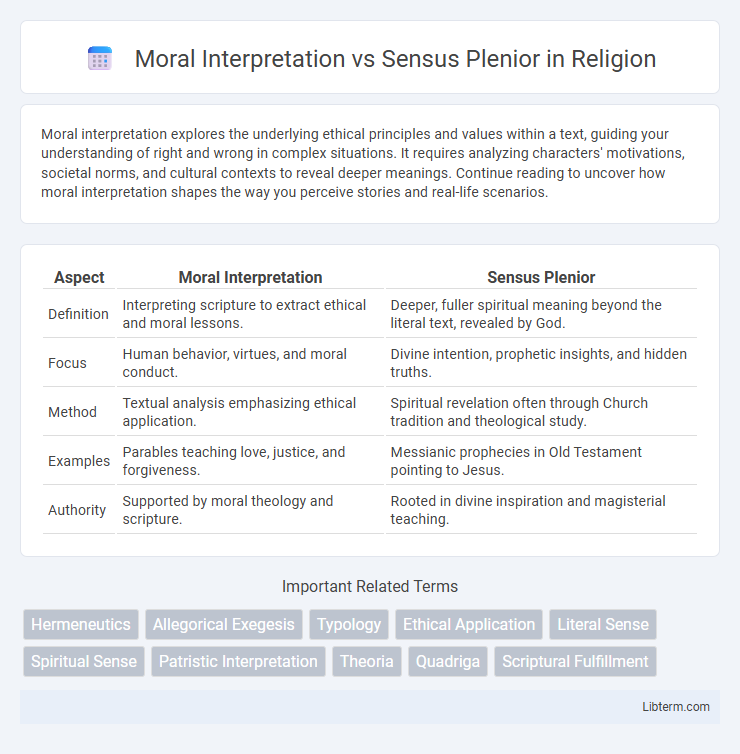Moral interpretation explores the underlying ethical principles and values within a text, guiding your understanding of right and wrong in complex situations. It requires analyzing characters' motivations, societal norms, and cultural contexts to reveal deeper meanings. Continue reading to uncover how moral interpretation shapes the way you perceive stories and real-life scenarios.
Table of Comparison
| Aspect | Moral Interpretation | Sensus Plenior |
|---|---|---|
| Definition | Interpreting scripture to extract ethical and moral lessons. | Deeper, fuller spiritual meaning beyond the literal text, revealed by God. |
| Focus | Human behavior, virtues, and moral conduct. | Divine intention, prophetic insights, and hidden truths. |
| Method | Textual analysis emphasizing ethical application. | Spiritual revelation often through Church tradition and theological study. |
| Examples | Parables teaching love, justice, and forgiveness. | Messianic prophecies in Old Testament pointing to Jesus. |
| Authority | Supported by moral theology and scripture. | Rooted in divine inspiration and magisterial teaching. |
Defining Moral Interpretation in Biblical Exegesis
Moral interpretation in biblical exegesis emphasizes extracting ethical principles and lessons applicable to contemporary life directly from the scriptural text. It involves analyzing narratives, commandments, and parables to uncover normative guidance for human behavior, without extending beyond the text's immediate context. This approach contrasts with Sensus Plenior, which seeks deeper, often divinely intended meanings that transcend the literal sense, enriching theological understanding beyond the original moral message.
Understanding the Concept of Sensus Plenior
Sensus plenior refers to the deeper, fuller meaning of a biblical text intended by God beyond the human author's original understanding, often revealed through later revelation or Christological fulfillment. This concept contrasts with moral interpretation, which emphasizes ethical lessons derived directly from the text for practical application. Understanding sensus plenior involves recognizing layered meanings within Scripture that enrich theological insight without negating the original context or moral teachings.
Historical Origins of Moral Interpretation
Moral interpretation, rooted in early Christian exegesis, emphasizes ethical teachings derived directly from biblical texts, contrasting with sensus plenior which suggests a fuller divine meaning beyond the author's intent. Historical origins trace back to Church Fathers like Origen who sought spiritual lessons applicable to Christian morality. This method shaped the tradition of extracting moral guidance, influencing later theological frameworks distinct from the broader, more mysterious implications proposed by sensus plenior.
Development and Application of Sensus Plenior
Sensus plenior, the deeper or fuller meaning intended by God beyond the human author's original intent, develops through ongoing theological reflection and scriptural revelation within the Christian tradition. Its application involves interpreting biblical texts with awareness of the Spirit's guidance, recognizing layers of meaning that inform doctrine and moral teaching beyond the literal or immediate context. This approach shapes hermeneutics by integrating historical understanding with spiritual insights, allowing for a dynamic engagement with Scripture that enriches moral interpretation and faith practice.
Key Differences Between Moral Interpretation and Sensus Plenior
Moral interpretation emphasizes extracting ethical lessons directly from biblical texts based on their historical and literary context, focusing on clear, applicable moral principles for contemporary life. Sensus plenior refers to a fuller, deeper meaning intended by God but not explicitly recognized by the human author, often revealed through later revelation or Christological fulfillment. The key difference lies in moral interpretation's reliance on explicit moral teaching versus sensus plenior's engagement with hidden or spiritual meanings beyond the text's immediate historical context.
Theological Foundations of Each Approach
Moral interpretation emphasizes ethical teachings derived directly from scriptural text, grounded in a hermeneutic that seeks practical guidance for righteous living, often aligning with historical-grammatical exegesis. Sensus plenior, or "fuller sense," proposes a divinely intended deeper meaning beyond the literal text, based on theological principles that scriptures can reveal truths progressively through divine inspiration. Theological foundations of moral interpretation rest on human reason and contextual ethics, whereas sensus plenior relies on the belief in prophetic foresight and the Spirit's role in unveiling layered scriptural significance.
Hermeneutical Principles Involved
Moral interpretation in biblical hermeneutics emphasizes extracting ethical teachings directly applicable to contemporary conduct from the text's explicit meaning. Sensus plenior refers to a fuller, divinely intended sense beyond the human author's conscious intent, often revealed through later revelation or Christological fulfillment. Hermeneutical principles involve discerning authorial intent, contextual analysis, and the balance between literal meaning and theological development to responsibly integrate both moral applications and sensus plenior insights.
Examples in Scriptural Analysis
Moral interpretation in scriptural analysis emphasizes extracting ethical lessons directly from biblical narratives, such as the Good Samaritan parable illustrating compassion and neighborly love. Sensus plenior, meaning "fuller sense," involves understanding a deeper, often divinely intended meaning beyond the literal text, exemplified by the Old Testament sacrificial system foreshadowing Christ's sacrifice in the New Testament. These approaches often complement each other, with moral interpretation focusing on practical ethics and sensus plenior revealing theological fulfillment across scripture.
Debates and Criticisms Among Scholars
Debates regarding moral interpretation versus sensus plenior center on the extent to which biblical texts convey deeper, divinely intended meanings beyond their original context, with scholars questioning whether moral lessons can overshadow historical intent. Critics argue moral interpretation risks imposing contemporary ethical views anachronistically, while proponents of sensus plenior emphasize God's fuller revelation through scripture's progressive unfolding. The tension persists between maintaining exegetical fidelity and embracing the dynamic, layered nature of biblical truth in theological discourse.
Contemporary Relevance and Future Directions
Moral interpretation emphasizes extracting ethical lessons directly applicable to contemporary societal challenges, fostering actionable guidance for justice, equity, and human rights. Sensus plenior involves uncovering deeper, divinely intended meanings beyond the literal text, offering profound theological insights that can reshape modern faith perspectives and ethical frameworks. Future directions point to integrating these approaches to enrich biblical hermeneutics, enhancing relevance in addressing complex moral dilemmas and advancing inter-disciplinary dialogue between theology, ethics, and cultural studies.
Moral Interpretation Infographic

 libterm.com
libterm.com